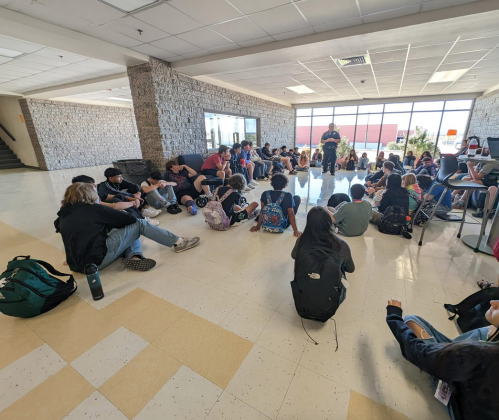An unexpected source provided insight and spurred conversation about a document that guarantees civil rights and liberties for Americans.
The Bill of Rights - the first 10 Constitutional Amendments - became law on Dec. 15, 1791. Today marks the 232nd anniversary of the inaugural document which was eventually expanded to 27 amendments.
In essence, the 10 edicts ratify natural freedoms which a government can not tread upon.
On Dec. 7, Marble Falls Independent School District welcomed one of its school resource officers (SRO) to share facts and kindle discussion about the Bill of Rights.
Marble Falls Police Department SRO Kevin Koch shared insight about the sessions with students.
Q: How were you called upon to teach students this lesson?
A: “I was asked by eighth-grade social studies teacher Mrs. (Courtney) Williamson to speak to her, coach (Andrew) Landin and Mrs. (Amber) Childers classes.
I was able to speak to every class period throughout the day.”
Q: Which amendments inspired the most discussion and interest?
A: “It appeared most of the kids were interested in the First, Fourth and Fifth Amendments, which I kind of expected.
“The kids wanted to know about the expectations of privacy at school, the difference between searches at school and on traffic stops, and the issuance of Miranda Rights.”
Q: What was the main lesson you hoped the topic would convey to the students?
A: “The goal was to inform them of their rights, when, where, why and how they can use their rights, and how important it is to have even just the basic information on the Amendments.
“I gave them the opportunity to ask any questions and provided scenario-based answers.
I believe each of them were able to take something away from our discussions.”
Q: Why is it important for the students to learn about the Bill of Rights?
A: “The students need to know about the rights they have.
In my opinion as a police officer, the best way to bridge the police and the community is with community relations and offering complete transparency.
“I believe a great way to do that is through youth interaction and explaining to them what police officers do. We owe that to them.”
Bill of Rights
Amendment I
Congress shall make no law respecting an establishment of religion, or prohibiting the free exercise thereof; or abridging the freedom of speech, or of the press, or the right of the people peaceably to assemble, and to petition the Government for a redress of grievances.
Amendment II Right to bear arms
A well regulated Militia, being necessary to the security of a free State, the right of the people to keep and bear Arms, shall not be infringed.
Amendment III
Quartering of soldiers
No Soldier shall, in time of peace be quartered in any house, without the consent of the Owner, nor in time of war, but in a manner to be prescribed by law.
Amendment IV Search and arrest
The right of the people to be secure in their persons, houses, papers, and effects, against unreasonable searches and seizures, shall not be violated, and no Warrants shall issue, but upon probable cause, supported by Oath or affir mation, and particularly describing
the place to be searched, and the persons or things to be seized.
Amendment V
Rights in criminal cases
No person shall be held to answer for a capital, or otherwise infamous crime, unless on a presentment or indictment of a Grand Jury, except in cases arising in the land or naval forces, or in the Militia, when in actual service in time of War or public danger; nor shall any person be subject for the same offence to be twice put in jeopardy of life or limb, nor shall be compelled in any criminal case to be a witness against himself, nor be deprived of life, liberty, or property, without due process of law; nor shall private property be taken for public use, without just compensation.
Amendment VI Right to a fair trial
In all criminal prosecutions, the accused shall enjoy the right to a speedy and public trial, by an impartial jury of the State and district wherein the crime shall have been committed; which district shall have been previously ascertained by law, and to be informed of the nature and cause of the accusation; to be confronted with the witnesses against him; to have compulsory process for obtaining witnesses in his favor, and to have the assistance of counsel for his defense.
Amendment VII Rights in civil cases
In Suits at common law, where the value in controversy shall exceed twenty dollars, the right of trial by jury shall be preserved, and no fact tried by a jury shall be otherwise re-examined in any Court of the United States, than according to the rules of the common law.
Amendment VIII Bail, fines, punishment
Excessive bail shall not be required, nor excessive fines im posed, nor cruel and unusual pun- ishments inflicted.
Amendment IX
Rights retained by the People The enumeration in the Constitution of certain rights shall not be construed to deny or disparage others retained by the people.
Amendment X States’ rights
The powers not delegated to the United States by the Constitution, nor prohibited by it to the States, are reserved to the States respectively, or to the people.
Source: USHistory.org



